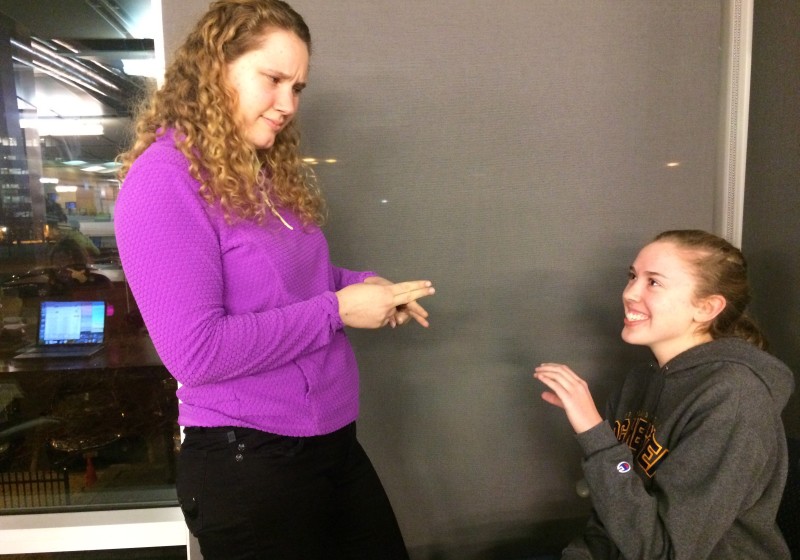When he tells people that he is deaf, Oliver Stabbe is called a liar. That’s because people assume deaf persons can’t speak, and he can.
“The idea that deaf people cannot speak is a very offensive assumption,” the sophomore said.
Another time, a woman on a plane asked him if his hearing loss was contagious. He sneezed and said he didn’t know.
Stabbe’s experiences speak to many of the misconceptions about deaf people and the struggles they face—things commonly found right in Rochester.
This city is home to 90,000 deaf people, a significant slice of the more than 1.1 million national population. The percentage of deaf persons here is higher than the national average, due in part to RIT’s National Technical Institute for the Deaf, the first technological college in the world created specifically for the deaf and hard-of-hearing.
At UR, many are deaf or hard-of-hearing, too. But some here find that they are stigmatized.
“Really, there seems to be an embarrassment in communicating with deaf people,” said sophomore Stephen Davis, another deaf student at UR.
This awkwardness might arise because non-deaf people just don’t know how to do so without possibly offending someone.
“I guess they think addressing my deafness is offensive, but it really isn’t,” Davis said. “It’s not a bad word, and deaf people don’t get upset about it.
Davis noted that the biggest issue he’s had when communicating with other students is “their apprehension to communicate at all.”
There are many misconceptions about how those who are deaf or hard-of-hearing might interpret non-deaf students’ attempts at communication.
“I often wish people knew that, even without knowing proper signs, simple gestures, or, if necessary, writing things down is not as inconvenient as it may seem,” Davis said.
Deaf and hard-of-hearing students may still face discrimination even with the resources that are currently available to them. Stabbe said that “a professor here at this university has refused to comply with my in-class accommodations because” she didn’t like it.
On advice for those who want to communicate with those that are deaf, he said that “coming up with paper and a pen is wonderful, for starters.” Others can also use “mime writing, because deaf people usually have paper and pen handy” he said.
“That sidesteps a lot of frustration on both ends, I think.”
Davis added, “I’d also say to not feel embarrassed if you run into a deaf person. Try to think of it as a language barrier, the same with someone who only speaks French.”
Stabbe advised that those communicating should not “make assumptions about preferences or ability. If you have a question, ask. A moment of awkwardness is absolutely worth it if you are being educated about an important topic.”
Deaf or hard-of-hearing students also face frustrations on their end when interacting with others. “Sometimes people talk about you, maybe to a hearing friend standing beside me, as if I’m not there,” Davis said. “That’s frustrating.”
Stabbe added, “Do not talk about a deaf person who is in your presence if they cannot understand what you are saying.”
Stabbe listed things one could say that might offend a deaf person.
One is: “Can I try on your hearing aids?”
“You would not ask a person who uses a wheelchair to just try it out, so please do not ask me to try on my hearing aids,” Stabbe said.
Another: “You’re so good at English/speaking for a deaf person!” If this is said to a deaf person, Stabbe explained, the speaker is implying that all deaf people have poor English skills and are unintelligent or unable to learn.
“Everyone has their own experiences and it is not your place to reduce them” he said.
As Davis put it, “we don’t see ourselves as disabled, so the awkwardness is only one-sided.”






